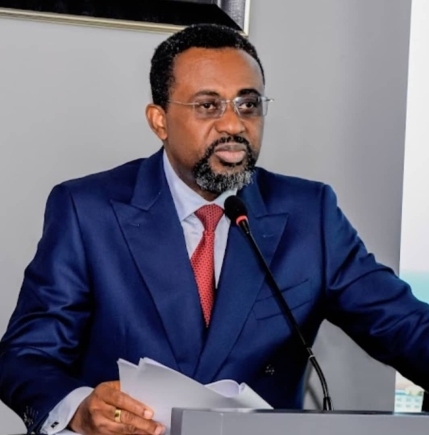Governor of the Bank of Ghana, Dr Johnson Pandit Asiama, has called for a fundamental shift in Africa’s trade relations with the United States, advocating a move from raw commodity exports to value-added, innovation-driven economic collaboration.
Delivering the keynote address at the African Leaders & Partners Forum in Washington, D.C., on Tuesday, Dr Asiama emphasised the need for strategic reforms to foster shared prosperity amid evolving global trade dynamics.
The forum, organised by the EBII Group and the Embassy of Ghana, convened policymakers, investors, and business leaders under the theme “Africa & the U.S.: Shaping a Trade-Driven Future.”
Present was the Acting Chief Executive of the Ghana Export-Import Bank (GEXIM), Sylvester Adinam Mensah.
Dr Asiama, drawing on Ghana’s economic trajectory, outlined both progress and persisting challenges in U.S.-Africa trade relations.
From aid to strategic trade
While acknowledging the African Growth and Opportunity Act (AGOA) as a pivotal framework since 2000, the BoG Governor noted that trade remains skewed towards extractive sectors.
In 2024, total U.S.-Africa goods trade reached $71.6 billion, with Africa recording a $7.4 billion surplus. However, heavy reliance on commodities, such as oil (constituting 65 per cent of Nigeria’s exports), and vulnerabilities in cocoa and textiles highlight the urgent need for diversification.
Ghana’s trade with the U.S., averaging $2.5 billion annually since 2019, reflects this trend. The country exported $1.6 billion in 2024, primarily crude oil, cocoa, and timber, while importing $874 million, yielding a $730 million surplus.
Dr Asiama, however, stressed that long-term gains depend on value addition, citing Ghanaian success stories like Niche Cocoa’s expansion into Wisconsin and U.S. investments such as Kosmos Energy’s role in Ghana’s oil sector.
Four pillars for sustainable growth
Proposing a recalibrated partnership, Dr Asiama outlined four key pillars: macroeconomic stability, financial resilience, trade integration, and inclusive digital transformation.
He urged reforms to AGOA, set to expire in 2025, to align with Africa’s industrialisation agenda, including incentives for value-added exports and digital trade.
“Strategic autonomy means transitioning from being a raw material supplier to a competitive production hub,” he said.
On financial stability, he pointed to Ghana’s Financial Stability Fund, developed with international partners, as a model for crisis resilience but called for broader adoption of supervisory technology (Suptech) to enhance risk management and credit access.
Investment opportunities
Dr Asiama highlighted high-potential sectors for U.S. investors, including agro-processing, energy infrastructure, and special economic zones under Ghana’s 24-hour economy policy.
However, he noted that limited trade financing remains a barrier, advocating for U.S.-Africa Trade Finance Hubs in collaboration with institutions like Afreximbank and the U.S. EXIM Bank.
On digitalisation, he welcomed the U.S. Digital Transformation with Africa (DTA) initiative but stressed the need for alignment with local priorities, including cybersecurity and interoperable payment systems.
A path forward
Concluding his address, Dr Asiama urged the U.S. to support Africa’s trade competitiveness through infrastructure financing, AGOA modernisation, and green technology partnerships.
“This is not about aid, but mutual growth,” he asserted. “Africa’s youthful population and rapid digital adoption present unparalleled opportunities for U.S. investors.”
The forum ended with a commitment to advance policy dialogues, positioning U.S.-Africa trade as a catalyst for equitable economic transformation.
